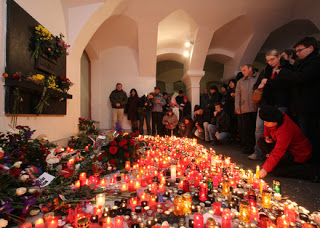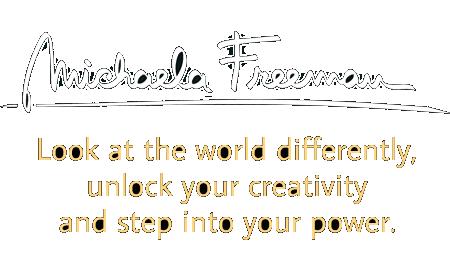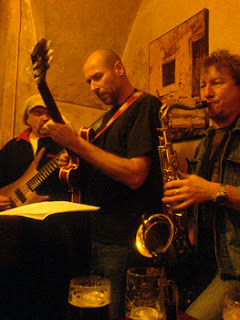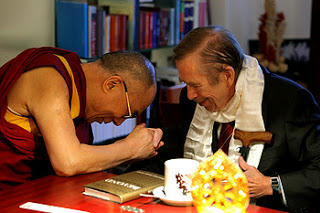Mourning with a Rock Band
The last few days since Vaclav Havel’s death have been emotional for this country. They’ve been emotional for me. His somewhat expected but still shocking absence is apparent on every step, from checking my mail or Facebook, to every street corner. The three days of national mourning may not be enough, but they will be done before we’re supposed to celebrate Christmas. Although the media urged entertainment organizers to consider cancelling shows, there was one that was not cancelled – last night’s Christmas concert of the Q-Rats.
My dear friend Robin is the front man of what’s essentially a jam band. They get together occasionally, when the members are not touring with Czech stars, playing on TV or in the recording studios. This is what they do in their “free time” – jamming together, playing jazzed up rock classics and rocked up jazz. They are pros. They’re rockers. Their drummer plays with Olympic, the Czech equivalent of the Rolling Stones. They know that Havel loved rock music and that if it was up to him, he’d want a rock’n’roll funeral instead of all the military and political pomp he’s getting.
 |
| Narodni trida Photo: Martin Kalasek |
On my way to the tiny pub just under the castle, my tram passed along Narodni trida. At the place under the arches, where students got beaten during the Velvet Revolution, the very place where it all started, I saw many candles and flowers for Havel. That too is emotional.
I walked up the cold street off Malostranske namesti and landed in the ultimate Czech pub, a place with cheap beer, its walls yellowed with smoke, a room that normally probably seats 20, but was quickly filled with 50 or more people and a five-piece band.
Robin was just talking to some man about Havel, fellow like many in this room, who’d met the president on several occasions. He works in the central bank and recalled Havel spending 25 minutes in his department, intrigued by the computer operations while his body-guards became frantic at the stretch of a 5 minute schedule. To his surprise, Havel also recalled their meeting some 10 years later when they were re-introduced at a party.
Then there was the story about Havel’s famously beautiful wife Dagmar answering a special mail delivery in her bathrobe, fresh out of the shower – causing the delivery man a near heart-attack. Still, she was no trophy wife. Dagmar is an exceptionally gifted actress and he was a playwright. Their marriage made sense. If a famous writer of plays or films married Meryl Streep or Audrey Hepburn – would anyone wonder why? My thoughts go to her now, watching her caught up in the machinery of a state funeral with seemingly no space for her own needs for peace and reconciliation.
All the stories simply point to one undeniable fact – the Havels remained “normal people” despite their status. This was also true with his first wife Olga, an incredible force for humanity and the real hero of the Havel drama. As Robin chipped-in his own personal story of meeting Havel, I realized that in this crowd, the number of people who knew him was improbably high per guest. I never met him, but I know many people who did.
The pub was getting crowded, then jam-packed against the walls, even though there was no advertising. This was practically a private party. My husband saved Robin’s performance crisis, retrieving a left-behind electric cable for his keyboard, arriving by cab and staying for the show. My friends Nicholas and Xavier came too, Nick is a British young man who teaches English here, Xavi a charming French engineer.
We sat so close to the band that during the show I handed Robin his beers from our table and the band climbed over our bench (and us) to escape their little corner for breaks. This naturally became a more and more acrobatic feat with the increase of beers and our wedged-in banker friend proved crucial, regularly squeezing aside and providing a helping hand as they struggled over him.
When My Voice Fails Me
The evening was dedicated to Vaclav Havel and Nicholas mentioned that he was surprised how emotional his students were about it. “I always ask them about their week and this time they simply fell silent. One said it’s so sad, staring off into space and another woman looked like she was going to cry, so I changed the subject. Of course I realize Havel’s significance, but at the same time I wonder what it’s like to feel this strongly about a man you don’t know personally.” I tried to explain, but my voice failed me and my eyes filled with tears, as Nick gracefully changed the subject.
What I’d tried to tell him was that despite what the media say and all the political bullshit, despite the crowd mentality probably causing some over reaction, despite the theatre of the absurd (as Karel Schwarzenberg aptly named the fact that Havel’s funeral is being organized by his main adversary, Vaclav Klaus) despite all this, we all loved Havel for his humanity. We loved and admired his willingness to admit his failures but continue to work on the betterment of our world, for his kind sense of humor and incredible wit.
Those who knew him personally adored him, whether they were Charter 77 signatories, friends, artists or students. Those who cared closely enough to read his writing respected his intellect and morals, because he was one of the few Czech beacons of sanity. Those who saw him only while they stood in Wenceslas square in 1989, or later on TV, saw evidence enough of all those traits to “get it”. The Dalai Lama got it too, coming eight days before Havel’s death to give him his blessings. What better sign of honor?
Then there are (as always) his adversaries – the ultra right-wing politicians, the ultra left-wing politicians, the ex-communists, the big business execs, the mafia types who feared him like Satan and couldn’t find a good word for him while alive or dead. There are those who complain about all the things Havel didn’t do, provide or ensure. The selfishness of those perceptions is simply stunning. I’m sure he thought many of the things he did were mistakes, who wouldn’t? But in the scheme of things, c’mon, people!
Interestingly, most of these complainers essentially voice the old notions of the working class being it and Havel having been a useless intellectual, an idealist, a dreamer. Somehow they fail to look around to see how much work was accomplished during the last two decades – work that wasn’t being done (and couldn’t be done) under communism.
These complaints are an insult to all the incredible improvements we have seen – our cities reconstructed, our hospitals getting new equipment, people starting up businesses, providing 24/7 services … those are workers, who make it all happen! And they made it happen even when an overly capitalist system and crooked politicians gave them no support. All they needed was the opportunity to do it. Hats off.
These workers are no longer portrayed on oversized posters with propagandizing mottos. They aren’t glorified, they’re just doing their job. They are taking home decent salaries and go on holiday. They buy computers for their kids and drive Skodas to summer houses on weekends. And by the way, Skoda is the best selling import car in Britain. Who would ever believe that in October of 1989?
What happened to us, to Czechs and Slovaks, was being given a man who relentlessly fought for our freedom and, when the fight became a close call, made sure it was non-violent. This happened twice – first during the Velvet Revolution and then the split with Slovakia.
It was not Havel’s idea to separate the country, he had to deal with Vladimir Meciar, the Slovak mad man, ultra nationalistic and nearly fascist who (for his own personal interests) proclaimed that “Yes, we want to join the EU, but on our own.” A military conflict could have been the obvious outcome when dealing with an ego like his. It wasn’t and both countries are now indeed in the EU, the Slovaks having seen through him and eventually throwing him out.
I am trying to explain the simple fact that I remember our national lives “before” and compare them to my life now. I’m the first to complain about Czech politicians and their bribery and thievery, their ignorance of public need for sure, but hey, we voted for them. As the Dalai Lama pointed out, our politicians directly reflect the moral values of our society, coming not from outer space, but from us. If it’s okay for employees to steal from their employers, if we live in a country where you don’t dare to stack building materials for a single night outside your fence or else they won’t be there in the morning, it’s no surprise our politicians do the same on a massive scale.
The Crown of Thorns
Havel was to run with dogs and caught amazingly few fleas. But he swam with sharks and took the consequences on our behalf. My friend Petr Krupík Krupička once took a photograph of Havel with a crown of thorns and Havel was amused by the image. Freedom was
ours, but the responsibility that goes hand-in-hand with it pretty much failed to arrive at the same time. If he was a martyr, then this explains why, because we went about our business and forgot him, forgot the ongoing need to continue the fight for our freedom and well being.
 |
| On the photo left / photo on the right by Petr Krupik Krupička. A campaign for www.antikomunismus.cz to get people to go voting. |
„They made me the consciousness of the nation so that they wouldn’t have to worry about their own,“ he once complained. If he failed, it was because he took on the job of being our consciousness and not throwing it back in our lap fast enough and hard enough. It wasn’t in him, so he tried the nice, non-violent methods and we were too busy with ourselves to listen.
The Dalai Lama said an interesting thing: „I’m leaving in two days, but your problems will stay, you have to solve them yourself.“ We were a nation used to having someone take care of us, even if that someone was evil and abusive, like the Nazis or Communists. We failed to hear what the Dalai Lama made so clear – if we have problems, we allowed them and we have to solve them ourselves.
When I first heard of Havel’s death, I cried, but I cried for the nation, for us. Suddenly the evidence of before and after was compared and the changes were so dramatic I could not bear the banter of people who bitched and moaned about what Havel did wrong. I cried because it all came into focus and I realized how much we gave up on him, on his ideals and morals. We believed in those things in November of 1989, but when the euphoria for freedom and togetherness fizzled out, we didn’t really know how to be free and together. It required personal responsibility and change and those were too painful. So we let it slide and now we complain. We’re good at that. We have practice.
Wish You Were Here
Tonight I cried again, this time for Havel himself. Robin’s musicians began playing a Pink Floyd cover and he asked them to wait, so that he could really dedicate this one to Vaclav Havel. The banker wept, my American husband wept, I wept and there was not a dry eye in the place, but for those who somehow missed the dedication. From what I could see, not more than a meter away, Robin was either sweating a lot or crying as well, mixing the sweat and tears. His voice shook, but I thought he did an incredible job, singing lyrics like:
And did they get you to trade your heroes for ghosts?
Hot ashes for trees?
Hot air for a cool breeze?
Cold comfort for change?
And did you exchange a walk-on part in the war for a lead role in a cage?
How I wish, how I wish you were here.
We’re just two lost souls swimming in a fish bowl, year after year,
Running over the same old ground.
What have you found? The same old fears.
Wish you were here.
There couldn’t be a more accurate description of Havel, who literally exchanged a walk-on part in the war for a lead role in a cage. Czech Presidents have limited power compared to other countries and his was definitely a lead role in a cage. Still, he often gets blamed for “allowing” this or that to happen, when all he could do was criticize and he did that amply, we just failed to listen or worse yet, failed to act.
What I tried to explain to Nicholas was the inexplicable. The breadth and depth of my personal experience of life without freedom, in a society that took its brightest and denied them education or career, put them into jail and spent decades cutting the branch we all sat on and being proud of it.
RIP Martin Kreuzberg
Robin’s Wish You Were Here also reminded me of Martin Kreuzberg, our friend who died just a few weeks ago just up the street on Nerudova. His spirit was with us too. Martin was a drummer with an alternative rock band and many other bands. A man haunted by his childhood experiences, the pressures of the regime and an inability to be who he wanted to be under the circumstances. A bright, kind and free-thinking man. He escaped to Canada in the 1980’s and came back after the Velvet Revolution.
When the priest at his funeral said it wasn’t until this year that Martin restored his relationships with his brother and mother, it didn’t take much to imagine why. He left them behind. They suffered for his leaving. Having a ‘traitor’ family member was included in personal files that followed from school to school, from employer to employer, files we never saw but which defined our careers and destinies.
 |
| We’ll never lose our black sense of humor, though…. |
Martin died by a series of mistakes that isolated meant nothing, but together were deadly and destructive, the priest said. He was overstressed from work, going home late at night on a motorcycle. The police wanted to stop him for failing to make a turning signal. There may have been other circumstances – a beer before he left, an expired driving license, who knows? He tried to outrun them and found himself literally in a dead end street.
My first thought was that his mind simply slipped a gear under stress and, given his personal history, he simply snapped when chased by the police. We’ll never know. Seeing my friend on TV news being carried away on a stretcher was one of the saddest things ever.
The tragedy is highlighted by the fact he had a passenger who ended up with severe injuries. No one at the funeral mentioned that, no one spared a prayer for his recovery, no one passed a hat for donations to make that recovery at least a bit easier. That’s the real tragedy for me, our inability to cope with reality, the emotional infancy that often keeps us from doing what’s right. This is a heritage of our communist past as well. We’re all still wounded and simply wear nice clothes to hide the wounds.
Looking in the Mirror
Much has changed though and last night exemplified the changes. It was like looking in the mirror. I sat there with my American husband, my British and French friends, whom I would have never met had the Iron Curtain not been melted down. I was surrounded by Czechs who study whatever they want, travel wherever they want and pretty much do what they want. Right then they wanted to be in a pub and listen to Robin (a Brit, who also wouldn’t be here) singing Pink Floyd and James Brown, both of whom were once illegal. In fact most of that particular audience would probably be on the government’s shit-list or in jail.
When Robin needed to remember lyrics, he pulled them up online on his cell phone. Excuse me? We had no copy machines available back then, because people might copy samizdat literature or political pamphlets, much less being able to access information at any time and call people from anywhere. Now we have a copy center open 24/7 in case you want to publish a pamphlet, any pamphlet. But you don’t even need that. We have the internet and social networks. I had my laptop with me – another super-scary device for totalitarian regimes.
Earlier this week I translated a story for the Best European Fiction anthology, to be published in the US. A little over two decades ago, we were not even considered European enough for such a publication and a Czech writer included in it would likely be persecuted, even though he submitted a love story. Actually, if an open concert took place like Robin’s Q-Rats, it would likely have been raided by the secret police and several people would no doubt been in trouble – for having a party on a day of national mourning and singing political songs – in English!
 |
| Robin Finesilver, the Q-Rats and my Coke |
We wouldn’t have been wearing such personalized clothing because a) they weren’t available and b) you avoided attracting too much attention. Robin’s T-Shirt wouldn’t have sported a print of the score for Wish You Were Here that a friend made for him. Printing on T-Shirts was also pretty much out of the question. Jeans were illegal for a while for that matter and you could be kicked out of school for wearing them. From that perspective, half this crowd might have had a similar experience … and probably did.
I guess that’s what I tried to explain to Nicholas. The lack of freedoms translated into some very personal things in the old days, things we take for granted now. Looking around, the only reminders of the old days were yellow walls, wooden benches and the beer, the beer has always been excellent. And I still love tlacenka and pickled sausages, that’s about it.
Mom reminded me of the days when they secretly listened to Radio Free Europe and kept hearing news of Vaclav Havel being imprisoned not knowing what he looked like, the last time ending a mere 4 months before he became President.
I spoke to a woman whose partner was a Charter 77 signatory and she said a journalist wanted to know what it was like from a female perspective in those days, but she felt she had nothing to offer. “I don’t remember much, I was interrogated a couple of times, there were meetings, lots of interesting people around, parties … “ I suggested that being interrogated is definitely something to remember. “Not really. Everyone I knew was being interrogated. That was just part of our lifestyle.” Well, luckily, it’s not part of ours anymore.
Our freedom was fought for not just by Havel, but the numerous unknown and now forgotten people who suffered under communism. Many died. My great-uncle was imprisoned and died for having dared to own a farm and refusing to have it be nationalized – read that, taken away from him. My neighbor’s son was killed during an interrogation just months before the Velvet Revolution. The effects of the evil were not as abstract as lines in history books.
Thank you, Mr. Havel
Havel’s coffin was carefully placed just up the hill at Vladislav Hall at the Prague Castle, awaiting the funeral in Saint Vitus Cathedral, ready for tomorrow’s pompous funeral with heads of states and celebrities. But I felt Havel’s spirit down here with us in the pub. A man most comfortable in pubs, he came to listen to some really good rock’n’roll. So did Petr Kolář, who stayed all evening enjoying the show and giving the guys a big hug at the end – the ultimate compliment from a master pop and rock singer.
Petr Kolář is not just famous for his hits, but sang in nine musicals, most of which could not have been written and produced under the previous regime. Hair, hardly likely. We take that for granted, go about our business and complain. Yet our freedom is real, practical and ever-present. The fact that its wings are clipped by the machinery of media, politics, big business and the military-industrial complex … well those are technical aspects we have the freedom to work on. Those are problems to be solved, as the Dalai Lama advised us.
We solved the big one. No, you did, Mr. Havel, you and your dissidents. We just showed up on the square in 1989 to jingle our keys and be kind to one another for a while. Since then, we have mostly forgotten. And because You don’t know what you’ve got ‘till it’s gone, we forgot that we can be free, that we can change things. Your death is a huge reminder that we have a lot to be grateful for, a lot to celebrate.
The Show Must Go On
The Dalai Lama talked about how to deal with the loss of someone dear to us and, speaking shortly after having visited Havel, it’s obvious the thrust of what he had to say. He said the only way to honor them is to fulfill their dreams, to go on and do the things they would have wanted us to do. For a start, we went on and celebrated our mourning and we all firmly believe that, with his love of rock music, Havel would have enjoyed it. We played for him, we cried for him, but what he wanted us to do was to use our freedom and I certainly hope we don’t forget that.
We walked outside into the chilly winter night and noticed a police car in front of the pub. No doubt, someone complained about the noise. Seeing it standing there, I froze. I still do. My brain knows that police are here to “Help and Protect” as it says right there on their fancy new Skoda. I even have a friend who’s a policeman and honor his dedication to his work. My brain understands. My nerve endings don’t. Like Martin, I have the inbred panic of seeing a police car that causes a reaction before I can first think.
The cops stood around for a while and looked at their watches as I was buttoning my coat. It was just after midnight and they could see the party was over. “Nic, jedem,” said one and they got back into their car – “Nothing, let’s go.”
Thank you Q-Rats for the evening of music, love and healing. We all needed it.
RIP Vaclav Havel and Merry Free Christmas to all the rest of us.










